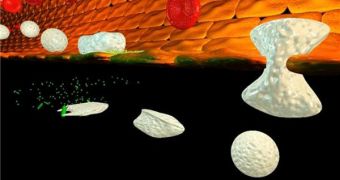[IMG=1]Researchers in Portugal managed to demonstrate the existence of a new type of white blood cells, which are capable of suppressing the immune system in just one organ. The finding could reduce the rate at which transplanted organs are donating, potentially saving thousands of lives.
Thus far, the newly-found NKTreg (reg from regulatory) cells were observing exerting their localized suppressive effect only in the liver. Whenever these cells are activated, they migrate directly in the organ, where they begin exerting their effects. This ability provides new hope for people who got, or will get, a liver transplant.
Whenever a person gets a new organ, regardless of what it is, he or she also needs to start a “diet” of immunosuppressive medication. These drugs are meant to ensure that the immune system does not attack the new organ, causing it to be rejected by the organism.
However, without the body's natural defenses, transplant patients easily fall victims to diseases and infections. This is why the drugs need to be administered in such a manner that they do not destroy the immune system entirely. Striking the right balance is incredibly difficult, investigators say.
Now, Portuguese scientists Maria Monteiro and Luis Graca managed to show that, at least in the case of liver transplants, things are bound to get better. If NKTreg cells are activated, they prevent the immune system from operating inside this organ. However, its function elsewhere in the body is left unaffected.
The thing about the new discovery is that its positive effects do not end with the liver. Once this immune system-tolerant organ is produced, experts can express any type of tissue or gene they want into it. The technology has massive potential for biotechnology and medical therapies.
Monteiro and Graca have already been awarded with a patent for the production and therapeutic use of NKTreg cells in human subjects, AlphaGalileo reports.
“The liver is already the transplanted organ with higher chances of success due to its unique characteristics, by using these new cells we might be able to achieve almost 100% organ acceptance and this without touching the remaining [immune system], what is remarkable (sic!),” Garca says.
“Patients might be able to survive with only a minimum dose of other immunsuppressors,” he adds further. Food and microbial molecules pass through the liver all the time, which is probably why immune control in this organ is lower than in other parts of the body.

 14 DAY TRIAL //
14 DAY TRIAL //